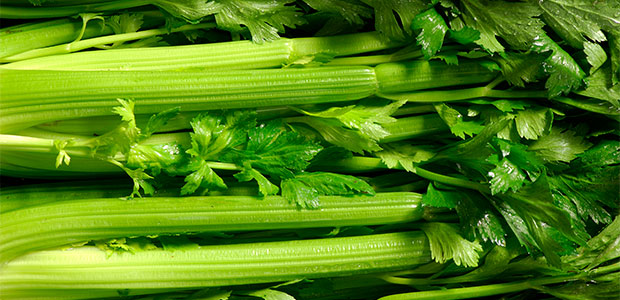Advertisement
Take Stalk in Celery
Vegetable power lowers cholesterol and more

The modern celery originated from wild celery native to the Mediterranean, where its seeds were once highly valued as a medicine. Like many other folk medicines, modern research is upholding the medicinal value of this common plant. In particular, scientists are evaluating a compound in celery known as 3-n-butylphthalide, or 3nB for short.
3nB is a compound that is unique to celery and is responsible for the characteristic flavour and odour of this vegetable. It was discovered as the active component of celery in response to investigations by researchers into the medicinal effects of celery, including the lowering of blood pressure and the relief of arthritis pain.
3nB appears to help lower blood pressure by both acting as a diuretic and vasodilator in a similar manner to drugs known as calcium-channel blockers. 3nB has also been shown to lower blood cholesterol levels and reduce the formation of arterial plaque in experimental animal and test tube studies. This effect may increase the elasticity of the blood vessels and also lead to lower blood pressure readings. 3nB also appears to promote some effects on areas of the brain that control vascular resistance.
The benefit of celery extract for high blood pressure is its apparent safety and the fact that it has a very unusual mechanism of action as a diuretic. Most diuretics change the ratio of sodium to potassium in the blood. As a result, dangerous side-effects caused by either too much potassium or sodium can occur. In contrast, celery extract acts as a diuretic but does not alter the blood ratio of sodium to potassium.
The research on the blood pressure-lowering effect of celery and celery extracts is preliminary, but I think it is certainly worth giving it a try, as some people have noted significant reductions in blood pressure readings. What future research will probably show is that some people with high blood pressure will respond to celery extract, while others will not. This occurrence is not unusual. Physicians treating high blood pressure can tell you there is a similar phenomenon that occurs with conventional blood pressure drugs.
How much celery or celery extract should you take for high blood pressure? Consume eight ribs of celery per day or take a celery extract standardized to contain 85 per cent 3nB at a dosage of 75 to 150 milligrams twice daily.
What other effects have been noted using 3nB? The compound has shown tremendous promise as an anti-cancer phytonutrient and detoxification aid in an experimental animal model, but it is getting more attention still as a pain reliever in arthritis, fibromyalgia and gout.
What is the proper dosage and are there any side-effects? More than 100,000 people in Australia have now used celery extract standardized at 85 per cent phthalides without any reports of side-effects. Based on information now available from trials and clinical experience, the current recommendations for joint and muscle complaints are below.
For the relief of joint and muscle pain (including pain due to osteoarthritis, rheumatoid arthritis and fibromyalgia): 75 to 150 mg daily.
For gout: 150 mg twice daily. NOTE: 3nb appears to significantly lower the production of uric acid. However, the initial blood uric acid measurements may increase in people with gout as uric acid crystals begin to dissolve.
Do you have to take the celery extract continuously to have pain-relieving benefits? Yes. Results from studies to date indicate that as long as the celery extract is used, it keeps pain at bay. If supplementation is stopped, the pain tends to recur.
Can I take celery extract with conventional anti-inflammatory drugs? Yes. There does not seem to be any adverse interactions with conventional drugs.
Are there any contraindications? Since the effects of celery extract have not been evaluated for safety in pregnancy, it is generally recommended that it not be used during pregnancy or lactation. No other contraindications are presently known. As a precautionary recommendation, I would advise individuals taking the drug Coumadin (warfarin) to be closely monitored by their physician when starting to use celery extract.




